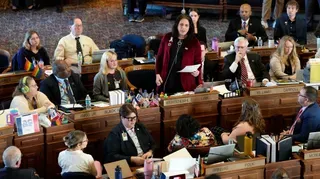March 25, 2011
Activists Push to Reform State HIV Exposure Laws
Joseph Erbentraut READ TIME: 4 MIN.
The case of a 20-year-old O'Fallon, Mo., man who is currently awaiting trial for allegedly punching and biting a police officer earlier this month may not seem all that unusual on the surface. The accompanying charges facing Willie Bishop, however, has raised red flags for HIV/AIDS activists working to reform HIV exposure laws on the books in 34 states.
In addition to the charges of assaulting a police officer and resisting arrest, Missouri prosecutors maintain Bishop knowingly and recklessly infected another person with HIV, a class B felony-despite the fact that the Centers for Disease Control and Prevention and public health officials throughout the country have not identified biting as a behavior that could potentially cause someone to become HIV-positive. It should be noted the officer was treated and subsequently released from the hospital, presumably testing negative.
Bishop, however, still faces a potential 15-year prison sentence on the reckless exposure to HIV charge alone.
His case is only the latest example of what activists and public health officials alike maintain is a spike in prosecutions of people with HIV/AIDS under Missouri law. Lawmakers passed the measure in 1998, and it remains among the most strict exposure statutes in the country. The American Independent reported last week that Missouri prosecutors have filed charges against five people with HIV/AIDS already this year.
The trend appears to be one that has gained momentum in other states as well in recent years. The Center for HIV Law and Policy's Positive Justice Project released a comprehensive report last fall that indicated at least 80 prosecutions under HIV exposure laws were made against those with the virus in the two-year period preceding its publication date.
Among the most extreme examples of prosecutions the report cited are a Texas man with HIV who received a 35-year prison sentence for spitting at a police officer and an Iowa man with an undetectable viral load who was sentenced to 25 years after a one-time sexual encounter where he used a condom. Another man with HIV in Michigan was charged under the state's "bioterrorism" law after he allegedly bit his neighbor.
Many states require those convicted under HIV exposure laws to register as sex offenders; hindering future employment, housing and other opportunities. Sources with whom EDGE spoke for this article said there have not been any recent examples of individuals accused of such charges who were ultimately acquitted.
The prosecutions, accompanied with the sensationalistic media coverage that often follows, can, in addition to forever altering the course of the accused peoples' lives, actually hinder HIV/AIDS activists' efforts to educate the public and prevent further spread of the virus. While perhaps intended to discourage high-risk sexual behavior, they may inadvertently encourage individuals to remain in the dark about their HIV status-often their only defense should they face HIV exposure-related charges-or hesitate to disclose their status to their sexual partners.
Alison Yager, a supervising attorney with the HIV Law Project in New York, told EDGE that HIV exposure laws not only "abandon basic human rights, perpetuate stigma and discrimination and undermine public health goals, but in some cases, like those laws that criminalize spitting by an HIV-positive person, they ignore the science of HIV transmission."
"By scaring people away from testing we're thwarting one essential piece of our prevention efforts," she added.
Research backs Yager's assertion.
A 2005 study found that those who are aware of their HIV status are 68 percent less likely to engage in unprotected intercourse and other high-risk sexual activity with HIV-negative individuals.
Yager and other advocates' criticism of laws criminalizing HIV exposure are also in line with the National HIV/AIDS Strategy that the White House's Office of National AIDS Policy released last year. The report maintains that intentional HIV transmission is "atypical and uncommon" and that exposure laws do not affect the behavior of people living with the virus in the states where such laws are on the books. The strategy widely references the CDC's research on HIV/AIDS.
"In many instances, the continued existence and enforcement of these types of laws run counter to scientific evidence about routes of HIV transmission and may undermine the public health goals of promoting HIV screening and treatment," reads the report. "State legislatures should consider reviewing HIV-specific criminal statutes to ensure that they are consistent with current knowledge of HIV transmission and support public health approaches to preventing and treating HIV."
The National Alliance of State and Territorial AIDS Directors also spoke out strongly against HIV-exposure laws last month. NASTAD described Missouri's statutes and those in other states as "undercut[ting] our most basis HIV prevention and sexual health messages, and breed[ing] ignorance, fear and discrimination against people living with HIV."
In order to defeat the laws as they currently stand; Terrance Moore, associate director of racial and ethnic health disparities for NASTAD, and other HIV/AIDS activists are calling for increased public health leadership against their continued proliferation.
"I think we're seeing quite a bit of a groundswell of advocacy on this issue recently," he said. "We need to examine this issue in how it not only impacts public health while also paying attention to draconian policies within the public health sectors that are also not helpful. There's a variety of ways we can chip away at this."
Michael Ruppal, executive director of the Tampa, Fla.-based AIDS Institute, added further leadership is needed to ensure public awareness over the harm HIV criminalization laws cause."Our direction isn't to dictate in 50 states how they should be governed, but to look instead at the intent of the law when it was created and see how the prosecutions are following that intent," he said."There has to be an acknowledgment [by HIV/AIDS activists] that these laws are actually hurting people. The more we're able to share this information and identify the abuses of these laws, the easier it will be to start to get them off the books."
Yager also sees the power in increased public knowledge of these laws-even in today's political climate.
"As it becomes more evident that [the laws are] not serving their intended goals, it will become more difficult for legislators to defend and rationalize them," she added.
Joseph covers news, arts and entertainment and lives in Chicago. He is the assistant Chicago editor for The Huffington Post. Log on to www.joe-erbentraut.com to read more of his work.







